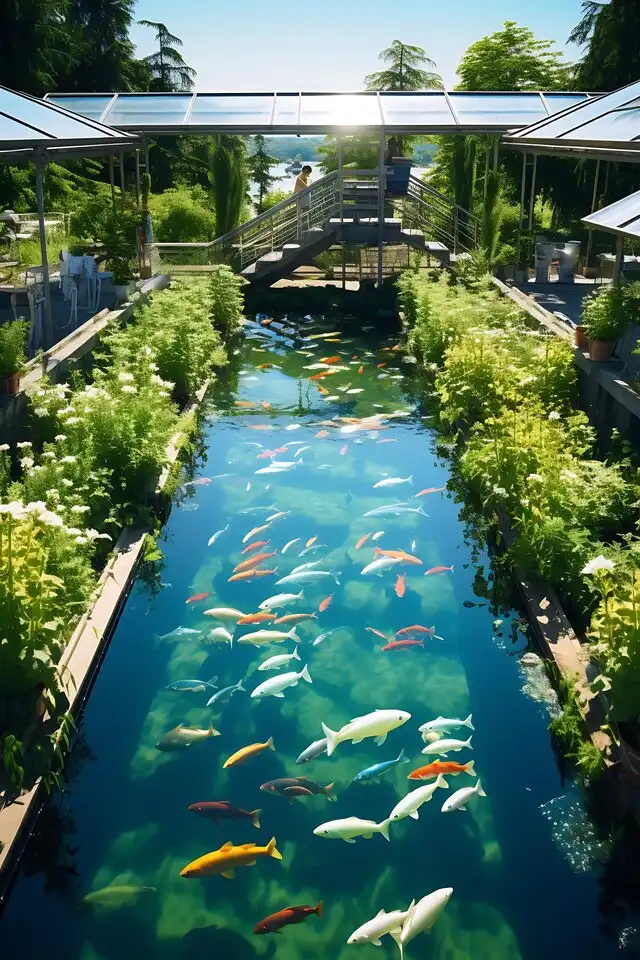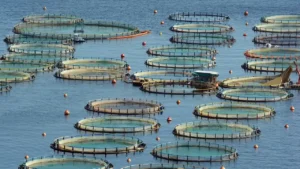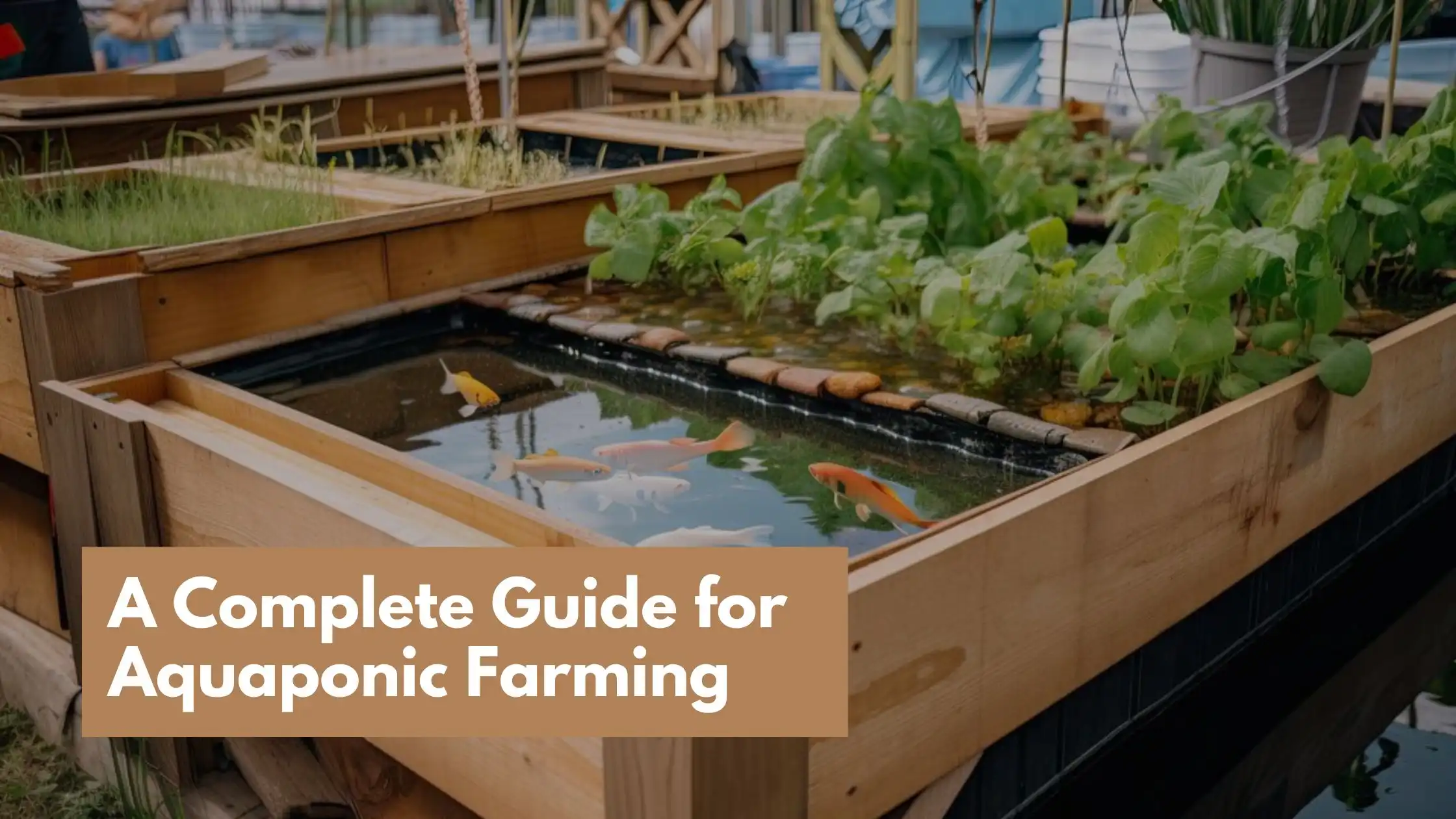Aquaponic farming is an environmentally friendly technology that combines aquaculture with hydroponics. It fosters a symbiotic interaction between fish and plants by supplying nutrient-rich water for plant development while cleaning water for the fish. This closed-loop system conserves water, maximizes land use, and produces all year. Aquaponics has organic, high-yield crops and is particularly significant in tackling agricultural difficulties in India. It represents a potential and creative method of food production that promotes sustainability and addresses food security.
What is Aquaponic Farming?
Aquaponic farming is a sustainable way of growing plants and fish in a closed-loop system. This novel method blends hydroponics, the practice of growing plants in nutrient-rich water, with aquaculture, the practice of producing fish in a controlled environment. The procedure starts with fish being housed in aquariums, where they generate excrement that is transformed into plant nutrients. The nutrient-rich water is then pumped into hydroponic grow beds, where the plants absorb the nutrients and clean the water before the fish reuse it.
This cycle fosters a symbiotic interaction between fish and plants, resulting in an efficient and environmentally benign system. Aquaponics vertical farming takes this innovation a step further by utilizing vertical space, allowing farmers to maximize yield even in limited areas. Aquaponic farming offers several advantages over traditional agriculture. Because water is recycled throughout the system, it uses substantially less water than conventional farming methods. Second, because pests cannot thrive in a closed-loop environment, it removes the need for pesticides and herbicides.
Third, using fewer resources enables farmers to grow food and protein sources on the same land. Furthermore, aquaponic farming may be done everywhere there is power and freshwater. It may be installed on roofs, in tiny urban locations, or indoors, making it suitable for metropolitan settings with limited space. Finally, aquaponic farming provides a novel approach to food production that is both sustainable and eco-friendly.
Benefits of Aquaponic Farming in India
Aquaponic farming offers several benefits, which are as follows:

- Water Conservation: Because water is scarce in many parts of India, proper water management is critical. Aquaponics is extremely water-efficient, requiring up to 90% less water than traditional soil-based agriculture. The closed-loop system recirculates and filters water, reducing waste and making it ideal for places with limited water supplies.
- Production throughout the year: Aquaponics provides year-round production, regardless of seasonal changes or weather conditions. This is especially useful in countries like India, where harsh weather patterns and monsoon cycles can disrupt traditional farming. With its controlled settings, aquaponics allows farmers to produce crops consistently throughout the year, providing a steady food supply and eliminating reliance on seasonal cycles.
- Land Utilisation: India has land availability and population density concerns. Aquaponics, which uses vertical farming techniques and small system designs, provides a solution. It may be used in urban settings or even on roofs to better use limited space. Aquaponic systems may be put up in tiny spaces, allowing city inhabitants to engage in sustainable agricultural practices while producing fresh food locally.
- Organic and chemical-free produce: Aquaponics does not require synthetic fertilizers, pesticides, or herbicides. Organically cultivated vegetables benefit from a natural source of nutrients provided by fish feces. This appeals to health-conscious people looking for chemical-free and environmentally friendly food alternatives. Aquaponics also decreases soil contamination risk and protects soil health for future generations.
- Maximize yields: Aquaponics enables high-density planting and vertical stacking, maximizing crop yields per square meter of land. Compared to traditional farming, continual fertilizer input to plants promotes quicker development and higher yield. Farmers benefit from enhanced yield potential, which makes aquaponics economically viable.
- Diversification and income generation: Aquaponics allows you to grow various products, including vegetables, herbs, and fruits. Farmers can vary their goods and meet the needs of the local market. Furthermore, aquaponic farming can generate additional revenue by selling fish, value-added goods, or even instructional tours and seminars.
- Climate Resilience: With increased hazards of droughts, floods, and temperature swings, climate change offers difficulties to traditional farming systems. By working in controlled conditions, aquaponics provides climate resilience by allowing farmers to manipulate temperature, humidity, and other factors for optimal plant development. This minimizes crops’ exposure to adverse weather occurrences.
Aquaponic farming has the potential to transform agriculture in India by providing sustainable and efficient food production while addressing critical issues such as water scarcity, land limits, and climatic unpredictability. Indian farmers may improve food security, promote environmental sustainability, and contribute to the country’s agricultural progress by using aquaponics.
Aquaponic Farming Business Plan in India

Creating a business strategy for aquaponic farming in India requires carefully considering several issues. The following are some crucial aspects to include in your aquaponic farming business plan:
Brief Synopsis: Give a brief explanation of your aquaponic farming company, including its vision, purpose, and goals. Highlight your unique selling offer and the market opportunity you hope to exploit.
Description of the Company:
- Describe fully your aquaponic farming operation.
- Explain the precise aquaponic system design you want to utilize, the species of fish and plants you intend to nurture, and your farm’s output capacity.
- Discuss your facility’s location, size, and layout.
Market Research:
- Conduct extensive market research to discover your target market and comprehend client preferences and wants.
- Analyze the size, trends, and future potential of the aquaponic produce industry in India.
- Determine your rivals’ offerings and pricing methods.
- Examine market entry hurdles and differentiation potential.
Product Portfolio:
- Describe the crops you want to cultivate in your aquaponic system.
- Highlight your product’s distinctive selling advantages, such as organic, chemical-free, and year-round availability.
- Talk about any specialized markets or specialty crops you plan to target.
Marketing and Sales Strategy:
- Establish your marketing and sales strategy.
- Outline your promotional efforts, such as internet marketing, local collaborations, farmers’ markets, or direct sales to restaurants and stores.
- Create pricing plans considering manufacturing costs, market prices, and profit margins.
Management and Operations:
- Describe your aquaponic farm’s everyday activities.
- Describe essential personnel roles and duties, such as farm managers, technicians, and support workers.
- Describe the manufacturing process, water management, nutrient cycling, and fish care procedures.
- Discuss your quality control procedures to ensure the highest production standards.
Financial estimates:
- Provide a thorough financial analysis that includes start-up costs, operational expenses, and revenue estimates.
- Include a break-even analysis and cash flow projections for the first several years of operation.
- Evaluate the return on investment (ROI) and identify your financial requirements, including prospective funding sources.
Risk Management:
- Assess possible risks and problems influencing your aquaponic farming operation.
- Market volatility, illness outbreaks, regulatory compliance, and climate-related hazards are all aspects to consider.
- To handle these difficulties, create risk mitigation methods and contingency plans.
Sustainability and Environmental Impact:
- Emphasize your dedication to sustainability and environmentally beneficial practices.
- Discuss water conservation, trash management, and energy-saving solutions.
- Highlight the environmental advantages of aquaponics, such as lower chemical consumption and carbon impact.
Considerations for the Law and Regulation:
- Understand and follow all applicable rules, regulations, and permissions about aquaponic farming in India.
- Investigate licensing requirements, food safety standards, and fish growing and hydroponics restrictions.
- Discuss how you will guarantee compliance and keep the required certifications current.
Future Expansion and Growth:
- Outline your long-term goals for the aquaponic farming company.
- Discuss prospective expansion opportunities, such as boosting manufacturing capacity, broadening product offerings, or entering new markets.
- Consider prospects for partnerships, collaborations, or vertical integration.
Research extensively, seek professional guidance, and tailor the business plan to your goals and circumstances. A well-structured business plan will guide your operations and be helpful when seeking finance or partnerships for your aquaponic farming firm in India.
Most suitable crops for organic farming
Aquaponic farming allows for the cultivation of a diverse range of crops. System design, water conditions, market demand, and personal preferences determine the crops most suited for aquaponic farming. However, the following crops are widely cultivated and flourish in aquaponic systems:
- Leafy greens
- Herbs
- Tomatoes
- Cucumbers
- Peppers
- Strawberries
- Microgreens
Conclusion
Aquaponic farming is an environmentally friendly technology that combines aquaculture with hydroponics. It conserves water, maximizes land utilization, and produces all year. Aquaponics delivers organic, high-yield crops as well as diversification options. It addresses issues such as water shortage and climatic variability in India. Acceptable crops include leafy greens, herbs, tomatoes, and cucumbers.
A well-structured company plan, conformity to rules, and long-term viability are all required. Aquaponics offers a promising path for agriculture in India, promoting food security and environmental conservation. Embark on your aquaponic journey with confidence and success.



